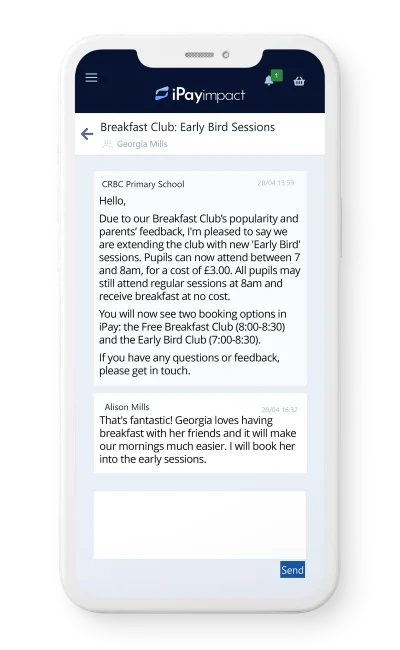School breakfast clubs play a crucial role in supporting pupils’ concentration, physical health, and readiness to learn (DfE). The resulting improvements in behaviour, attendance and academic outcomes also significantly benefit schools.
Many schools already run breakfast clubs, either at a small cost to parents or for free, as part of government or charity-funded schemes. The largest of these, the National School Breakfast Programme, gives around 2,700 schools a 75% subsidy on breakfast club costs, helping them provide free breakfasts to over 350,000 children each day.
However, this amounts to just 12% of state schools in the most disadvantaged areas, meaning many children can’t currently benefit from school breakfast clubs.

The new free school breakfast club offer
The government has committed to providing free breakfast clubs in every primary school in England. Approximately 750 schools are participating in an early adopter scheme, opening or expanding their breakfast clubs in the 24/25 summer term.
The programme aims to address child poverty and remove barriers to opportunity, and schools, parents, and pupils report a variety of additional benefits from existing breakfast clubs, including:
- Combatting child hunger: School breakfasts ensure pupils have the energy they need for the day and are often more nutritious than at-home options, as they must adhere to school food standards. Also, parents have reported that children with selective eating habits at home are happier to eat and try new or varied foods at school breakfast clubs.
- Boosting academic outcomes: An EEF study found that Key Stage 1 pupils attending school breakfast clubs made an average of 2 months of additional progress and showed improved behaviour. A York primary school has also reported significant improvements in punctuality and pupils’ attitudes to attending school since opening its breakfast club.
- Improving socialisation and well-being: The informal breakfast club setting is conducive to socialising and creates an opportunity for children of different ages to mix. It also gives pupils a softer start to the school day by bridging the gap between home and the classroom.
- Supporting families: School breakfast clubs provide essential support to families. Free or low-cost breakfasts mitigate the rising cost of living, while affordable wrap-around care helps parents access employment. 44% of working mothers say reliable childcare helps them to work, while over a third cite the necessity of childcare that fits their working hours. (DfE)

Government guidance allows schools to design and deliver their breakfast clubs independently, which may be welcome to some and daunting for others. Designing your breakfast club doesn’t need to be complicated; here are five steps to simplify the process.
1. Design your breakfast club with parents
Families are likelier to use a club that makes their morning routine easier. Involve parents in planning to ensure your breakfast club meets their needs.
You could conduct parent surveys and meetings or ask your parent-teacher association to help. However you consult parents, you’ll need to consider these aspects:
- Times: The government is funding 30 minutes of free provision immediately before school starts, but this can be combined with longer, paid-for sessions that families may choose to pay for.
- Venue: Your location must accommodate expected numbers, but you should also consider how seating arrangements, noise, and lighting may affect pupils. A calm, welcoming environment will prepare pupils for a focused start to the school day.
- Menus: Ensure breakfast options meet School Food Standards, cater to cultural, religious, and dietary requirements, and rotate to encourage a varied diet. You can simplify the process with Nutmeg, the complete nutritional platform that gives detailed reports to help school caterers follow standards for any age group. Then, decide whether children will choose meals each morning or if parents will pre-order breakfasts, as many do with lunches.
- Activities: Plan structured activities such as literacy and numeracy games, puzzles, drawing, and reading to focus children’s energies and use this time productively while keeping the club fun, encouraging attendance.

2. Give parents an easy breakfast club booking and payment system
Simplify logistics, including staffing and food provision, by offering parents an easy-to-use online booking and payment system.
Parents can easily book and pay for wrap-around care through iPayimpact. The integrated platform enables schools to collect online payments, eliminate cash handling, offer meal pre-ordering, and effortlessly manage wrap-around care. iPay makes it easy to invite selected pupils or whole classes to any activity, specify place limits and share information like terms and conditions. Plus, integrated online forms ensure parental consent and other essential information is collected as parents book.
With an impressive 4.9/5 rating on the Google Play store, parents love how the modern, convenient iPay online payment app helps them manage school bookings and payments anytime and anywhere.
3. Plan your club’s staffing carefully
Under the new government scheme, classroom assistants, teachers, school caterers, volunteers, and other school staff can all lead breakfast clubs. Including a mixture of staff roles can help manage costs while making the most of this valuable time. For example, teachers and school leaders can speak to individuals more easily in an informal club setting than in the classroom, helping them monitor pupils’ well-being.
Advance booking can help determine the number of staff needed each day, and schools must meet all statutory requirements, including staff ratios, safeguarding, enhanced DBS checks, and the EYFS framework (from September 2025).
4. Enhance wraparound care communications
Clear, ongoing communication with parents is essential, from setting expectations to communicating changes and celebrating your club’s success.
Headteacher Ash McGann lists her number one consideration for breakfast clubs:
“Sharing with both staff and parents the benefits you gain from your breakfast club [to] ensure everyone understands the positive impact it is having.”
Parents can easily miss important messages sent by letter or email. However, schools can send unlimited messages straight to their mobile phones using iPayimpact Communications. The iPay app’s instant messaging feature allows parents to read and reply to school communications anytime and anywhere. Push notifications alert parents to new messages, and schools can enable parents to respond in private conversation threads.

5. Centralise breakfast club administration
The right tools can simplify processes for breakfast club organisers, school administrators, and parents.
You can easily manage all your breakfast club admin with the user-friendly, all-in-one iPayimpact platform. Simply set up a fund to centrally manage all your bookings, payments, parent messaging, and information gathering from one central dashboard. Plus, it’s easy to run and export reports, analyse club finances or uptake, and share information with appropriate staff.





